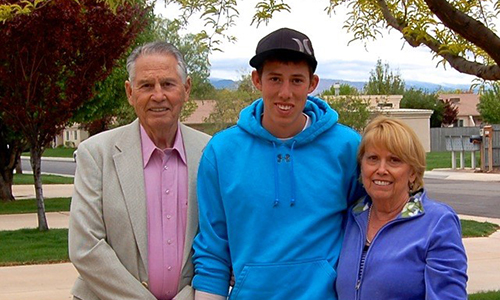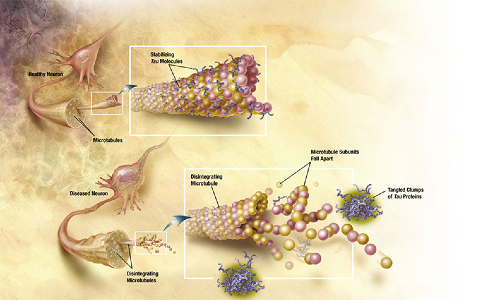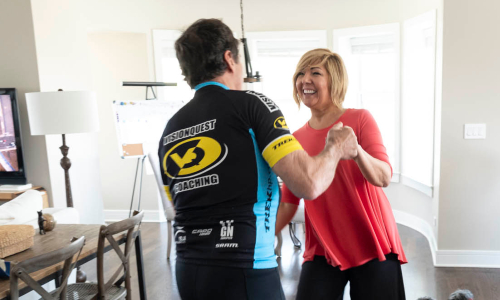Legacy Stories
Charles Mackey

Charles Mackey played football for Arizona State University and played for the San Francisco 49ers and Baltimore Colts before serving in the Korean War. When he returned from Korea, Mackey spent the majority of his career as a talent scout for the Dallas Cowboys. As Mackey got older, he began experiencing memory loss and lost his characteristic sharp mind and sociable personality. After his death in 2015, his family donated Mackey’s brain to the VA-BU-CLF Brain Bank where Mackey was diagnosed with advanced Chronic Traumatic Encephalopathy (CTE) as well as Alzheimers and Vascular Dementia. Mackey’s widow, Dianne, shared his story to highlight how much CTE affected him and to share her experience as a CTE caregiver.
By Dianne Mackey
My heart stopped one day in 2006. Charlie did not remember how to get home.
We were on vacation in Mexico where we had rented a condo for several weeks. The condo was situated eight to ten blocks uphill from the little downtown area. To walk to town the route, was one street down and another street up. We had walked it many times.
I felt like I had suddenly taken a punch to the stomach. Then disbelief and denial, until two weeks later it happened again and he was truly lost. A month after we returned home he suffered a small stroke. An MRI confirmed the worst—there were considerable abnormalities in Charlie’s brain. Our doctor in Moab, Utah referred us to Dr. Norman Foster, the Director of the Alzheimer’s Research Center at the University of Utah.
And so began the eight year journey of our “long good-bye.”
In real life, the bulk of Charlie’s career was working in the professional football world as a talent scout, an enviable job he sincerely loved. He traveled constantly from one college campus to another, one practice to another, in and out of rental cars, hotels, and airplanes; seeing “every inch of the USA,” as he used to say. Charlie and I were married in the middle years of his career. It was wonderful to travel with him as he scouted football practices, timed players, while seeing college games all over the country. We watched bowl games and playoff games, and spent one month every April in Chicago for the draft meetings. Twice we were in Hawaii for the Hula Bowl, once traveling with the Chicago Bears to Berlin for an exhibition game between the Bears and the 49ers. Even though his heart and his head were football, he had no trouble switching gears to pursue other interests-reading, poetry and music, just to name a few.
Charlie read constantly. During his early life, he read all the classics, later becoming a serious student of Spanish Colonial history. He read books on everything “New Mexico” (I think we drove on every back road in the state) and often memorized his favorite poems (I did a double take one day when I saw that he was reading the poems of Pablo Neruda, in Spanish). His devotion to his Catholic faith grew as he read book after book on theology, the saints, and the encyclicals of the various popes. He ordered so many books on religion from our local library, the librarian asked him if he was a priest!
He usually listened to classical music, with one exception—Mexican Rancheros—and together we discovered a love for operas. This was Charlie, always surprising me with his myriads of interests. He could do anything with his hands from creating lovely carvings to working with silver jewelry. He even tried painting. He was a meticulous craftsman, a popular handyman, in plumbing, electrical, laying tile, woodworking, or whatever was needed. Our landscaping was cut, mowed, trimmed and then cut, mowed and trimmed again. When the time came that he could no longer read or work with his hands, his interests of course narrowed and he became very happy watching Nova or Nature on television. John Wayne DVDs became his very favorite pastime the last couple of years of his life.
Charlie, was a solid principled man. Once he made a decision he could not be swayed. He was fiercely devoted to his church and was a caring considerate man of the less fortunate. I will always remember his comment that “the poor loved God more because they needed Him more.” It was not uncommon for him go out and help the gardeners or empty our trashcan when the men came by in their truck. Sometimes he went outside with a sandwich or six pack of beer for the workers. Very often he over-tipped the waitress, commenting that “she must be trying to raise three kids” (and then he would give the bus boy another tip).
In contrast, he did not suffer fools gladly, especially the materialistic or boastful. Charlie led a privileged life in the professional football world but never bragged about where he had been and who he knew, you had to drag it out of him. When he wore his Super Bowl ring, it was often turned to the inside unless he was working. I loved that he had real respect for women; a man using bad language around a woman could find himself being promptly escorted outside; the same with the obnoxious cell phone person.
How frustrating it was to deal with my husband as his memory became impaired, along with his very difficult behavior. This six foot three, strong healthy man declined by inches; he who had never broken a bone, suffered a serious injury, been in a hospital, or even taken an aspirin. When he was in social situations, he stopped entering into the conversations, as it was impossible for his brain to process the conversation fast enough to reply. Every day I had to adapt to a new Charlie and figure out a way to cope. This insidious illness robbed him of his ability to take care of finances, think clearly and logically, use good judgment, understand what he had just read, or write letters. He gradually withdrew from his children and grandchildren. My life as his caretaker vanished and his life became my life.
Months and trips to Salt Lake City went by. The doctors watched him and tested him in every way imaginable. Charlie was having more issues with memory and we were both frustrated with each other. I was also having a hard time dealing with his erratic behavior. A second MRI gave the doctors enough information to determine that he had “enormous and confluent” white matter disease, along with other irreversible vascular damage. The doctors told us that medical science had no way to stop the disease from progressing—he had five to ten years.
Close to the time we received Charlie’s diagnosis, Dr. Robert Cantu and Dr. Ann McKee at Boston University Medical School had begun to report their research findings on chronic traumatic encephalopathy (CTE) in deceased football players, linking it to brain trauma from concussions and sub concussions, and concluding that CTE continues to progress as it destroys the brain. I was unaware of their work.
Flash forward to 2013. Charlie was in a care center in Salt Lake City. Still unaware of the research being done, I happened to watch the Frontline documentary, “League of Denial” which laid out the published findings of Dr. Cantu and Dr. McKee about CTE along with other medical research on brain trauma. The documentary also included interviews with people associated with the NFL and their reaction. What a shock!
The rest is history. I searched for more information on traumatic brain injuries and ultimately focused on the Concussion Legacy Foundation and Boston University. I contacted Dr. McKee in Boston by email and within a day her team responded. In time, our family made the decision that we would donate Charlie’s brain for their research when he passed away.
Charlie just plain loved his life. I can see him now, throwing out his arms and saying, “What a beautiful day! How much more could a man want but to have a day like this and be with his girl.”
“His girl” was this lucky wife whose husband told her almost every day that he loved her.
Painfully for me, during his last few years he reminded me that we had had a beautiful journey. He needed nothing more and was anxious to meet God. This was his way of indirectly saying to me to be grateful for the beautiful 26 years we had been married. It was the closest he ever came to talking about his illness. This man had no regrets and was perfectly at peace.
After years of caring for my husband with a constant struggle, confusion, sorrow and hopelessness, life suddenly had a purpose. A feeling of great comfort came over me for the first time since that day when my heart stopped in 2006; a realization that maybe the tragedy of his illness could contribute to something meaningful.
Eight months after he passed away, in October 2014, the clinical study and research on Charlie was completed. It was determined Charlie had advanced CTE with a trace of Alzheimer’s and vascular dementia. Although the news was sad, it was a relief to better understand what Charlie had been going through. Dr. McKee told me Charlie must have been very heroic to have suffered with all three diseases without complaint.
Our family is most grateful for the love and sensitivity shown to us by Dr. Ann McKee, Dr. Todd Soloman, Lisa McHale, Patrick Kierman and their team. We spent hours with them on conference calls as they gathered information on Charlie’s life and football career.
We want to express our sincere gratitude to Chris Nowinski and Dr. Robert Cantu who founded the Concussion Legacy Foundation. These two men started asking questions, looking for answers, and found the first donors for Dr. McKee, which we now know lead to the discovery of CTE in professional football players. Without them it may have been years before CTE was linked to contact sports. Chris, Dr. Cantu and Dr. McKee have dedicated their lives to this continuing research, tirelessly working to promote safer sports. Our families’ hope is that the legacy of Charlie and the other athletes who have donated their brains to this valuable cause will be helpful in bringing to light the urgency of understanding brain trauma.
Excerpts From Charlie’s Obituary
Charlie prepared all his life to meet God, and so it was on January 22, 2014 he left this world and completed his journey. He passed away peacefully in his sleep after a long battle with dementia and Alzheimer’s disease. Charlie was born in Mescalero, New Mexico, and October 17, 1934 to parents Charles and Katherine Mackey, the youngest of three brothers and one sister. He was of Mexican/American decent; his father being Anglo and his mother Mexican. They moved to Tularosa, NM where Charlie spent most of his young school years. His youth in Tularosa “was glorious”, as he often remarked, always longing to go back to New Mexico. He seemed to identify more with the Spanish side of his world, being fluent in Spanish and loving the people and culture. His Grandfather Miller was a veteran of the Civil War for which he was very proud, and he cherished his Grandfather’s Civil War Reserve Medal.
When Charlie was fifteen his parish priest arranged for him move to Phoenix, AZ and enroll in St. Mary’s Catholic Boys School. He went to school there through high school. At St. Mary’s he was a three star athlete, culminating in a four year football scholarship to Arizona State. At ASU he was homecoming king, a four-year football letterman, and captain his senior year.
After graduation Charlie was drafted by the San Francisco 49’ers, later moving to the Baltimore Colts. He interrupted his professional football phase to fulfill his obligation to the R.O.T.C., serving his country in Korea. While in Korea he played football for the Army, winning the Far East Kimchi Bowl.
Returning to civilian life he spent five years as a football coach at Missouri. The next 22 years he was with the Dallas Cowboys and Tom Laundry as a talent scout. The last eight years of his career he was with the Chicago Bears and Mike Ditka. His career was exciting and successful, but if he were to tell you of what he was most proud it would be his service to his country and his Mexican/American heritage.
Charlie is survived by his wife Diane whom he adored, son Jon, brothers Richard and Howard Mackey; children Melanie and David Watson, Pearson and Sharon Frank, Carter Frank, and five wonderful grandchildren, Laura, Kody, Sam, Savannah, and Cheyenne, who all loved and cared for him during his long illness. Charlie will forever be in our hearts. We miss him.
A memorial mass [was held on March 26, 2014] at St. Vincent de Paul in Salt Lake City, internment [followed] at the Utah Veterans Memorial Park.
In lieu of flowers, love your loved ones and bless every new day.
You May Also Like

Learn about symptoms, risk factors, and what causes the neurodegenerative disease Chronic Traumatic Encephalopathy (CTE).
What is CTE?
Living with suspected CTE can be difficult, but CTE is not a death sentence and it is important to maintain hope. Find out how.
Living with CTE